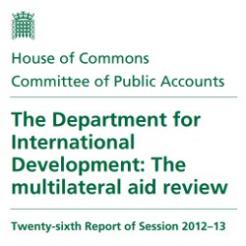The review of the Department for International Development's use of contractors was constrained by a lack of transparency by these organisations over their spending and results, says the Public Accounts Committee.
In its assessment of the review the Committee said that while the Multilateral Aid Review was a "significant step forward in assessing the performance of multilateral organisations" it was "limited by the availability of data" from these organisations.
"Without good quality information it is not possible to assess and demonstrate the value for money of UK aid," the Committee advised, recommending that DfID make improved data on costs and results a requirement for contractors seeking future funding.
The Public Accounts Committee commended for DfID on a review that was "more thorough and transparent than previous assessments", but said there is more progress to be made. It highlighted that while the Department had rated nine multilateral aid organisations as poor, it had so far only withdrawn funding from four organisations, totalling £8m.
DfID spent £3.6bn, almost half of its total aid budget, on core funding for multilateral organisations in 2011/12. Its budget is set to increase in real terms by 27 per cent between 2010/11 and 2014/15. The Committee warns that, "Public confidence in the value of UK aid depends on the Department demonstrating that the funds are well spent."
Cross-border collaboration
Providing recommendations the Committee said:
"Refinements to the review process will allow the Department to build on its successes and improve the effectiveness of future reviews.
"These include pressing multilateral organisations for better data on costs and results, better assessment of gaps and duplication in their activities, and strengthening the link between a multilateral organisation's performance and the Department's funding. Collaborating with other countries on reform programmes and sharing assessments will help the Department to maximise the impact of the review process and minimise the administrative burdens on multilateral organisations."
DfID's Multilateral Aid Review, which assessed 42 of its 182 providers, was conducted in March 2011 and an assessment of the Review was also conducted by the National Audit Office, which published its findings in September. It too called for greater transparency and specifically a shared framework and joint data collection system from DfID and its international counterparts.
A DfID spokesperson welcomed the Public Accounts Committee report, adding: "For the first time, funding has been stopped to four poor performers with four others put into special measures, and it is a model that has been adopted internationally.
"But we are determined to get even better value for money and more effective aid from multilateral agencies. We want to see clear evidence of reform in this year’s updated Multilateral Aid Review before committing any new funds. If it is not good enough we are prepared to stop funding."
A full response will come "in due course", said the spokesperson.
In September 2012 Justine Greening, who became Secretary of State for International Development shortly before, ordered an independent review of DfID's use of contractors following concerns raised in the national press about the salaries being paid to top staff at these organisations. The results of the review, undertaken by the Independent Commission for Aid Impact, are scheduled for the first quarter of 2013.

| Charity Finance Yearbook The Charity Finance Yearbook is the ultimate reference source for charity finance professionals. Providing updates, advice and trends on accounting and auditing, VAT and taxation, investment and banking, social investment and funding, legal matters, governance, impact, risk, IT and HR. |









